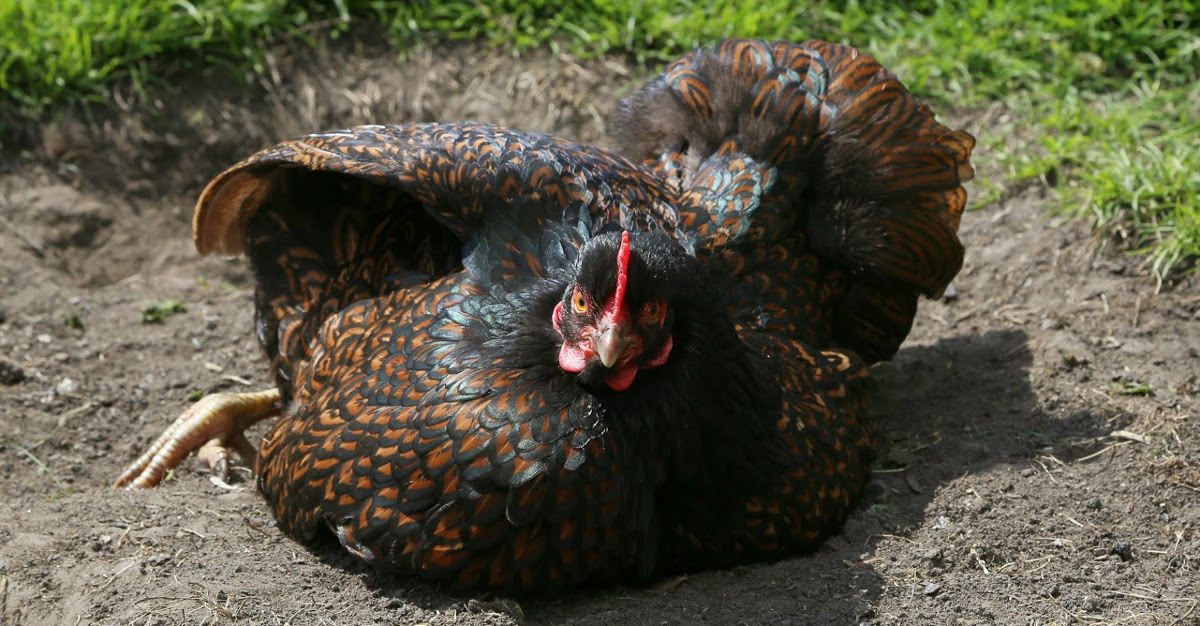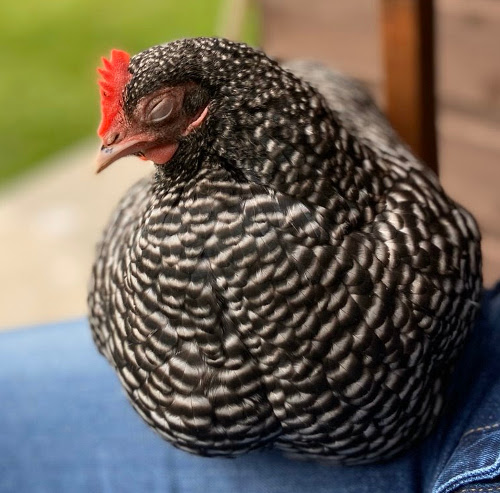How do you know if your chickens are happy?

Everybody wants to have happy chickens but how do you know they are as happy as they can be. I've had a lot of chickens for a lot of years and this is my take on knowing when they're happy and keeping them in the best of moods.
One thing to remember is that chickens are chickens and none of the sounds you attribute to sadness mean anything like the sounds humans make when they're sad.
Chickens that are happy, content and pain free will exhibit their natural behaviours like nesting, scratching, preening, dust bathing and regular egg laying.
Below: A chicken making subtle sounds of pleasure when being stroked on your lap that sound a bit like purring, a quiet sort of humming.

How can you tell your chickens are happy?
This is a list of things happy chickens do and the behaviours they show, it is in no particular order.
- Activity. Happy chickens are active roaming about looking in all sorts of nooks and crannies for interesting morsels. Unhappy or ill chickens tend to stand still or stare into corners. If your chickens are up and about, roaming and scratching they are content.
- Shiny feathers. Vibrant, healthy feathers have a sheen that gives chickens a sleek appearance that serves to protect birds from the sun, rain and weather.
- Perching and roosting. Being able to fly up to roosts is a good sign chickens are healthy and chickens will be happier sleeping on a roost at night.
- Preening is a natural activity that chickens indulge in when they are well fed and content.
- Regular production of solid shelled eggs with bright coloured yolks.
- Dust bathing and laying around in the sunshine. Chickens are flock animals and doing things as a flock helps with bonding and strengthening the pecking order.
- Happy chicken sounds. This can be anything from a quiet trilling to a purr, almost like a cat, to endearing squeaking, a bit like a rusty gate.
- They run to greet you when you show up. Chickens have accepted you as part of the flock and are comfortable around you. I sometimes feel like the pied piper when I'm in the field with my birds and they're all following me around.
- There is no stress in the flock.
Things that are not a sign of happy chickens:
Brightly coloured comb. Young birds or those having a break from laying don't necessarily have a bright red comb, indeed it can be quite pale. When hens moult or stop laying eggs for winter, the combs and wattles will fade to pink or a pale red colour and will also shrink in size.
When she returns to laying eggs, the combs and wattles will change to bright red again, but it isn't a sign she is happy and contented, just a sign she is in lay.
General noises. Some noise is to be expected from poultry but if your chickens are always screaming and making a ruckus then you can assume they either need help or they are demanding something.
Tips to keep your flock happy:
Making and keeping your flock of chickens happy is relatively straight forward.
- Safe space and access to pasture of some sort. Chickens are happier if they get some green space, a bit like humans.
- Appropriate food ration and clean water.
- Keep a clean and well ventilated coop.
- Allowing natural behaviours like dust baths,scratching, perching and comfortable nesting boxes.
- Treats, toys and boredom busters.
- A decent hen to rooster ratio. Too many cockerels can upset your flock by mating too often and fighting.
- Appropriate treatments and supplements.
When chickens are feeling bad or are in pain or sick, they stand motionless, often in a corner. A very sick and depressed chicken might sit for hours in the coop or hiding in a dark corner of the run.
Chickens in pain will stand rooted in the same spot, possibly for hours with their tail pointing to the ground. It is a classic posture called roach back.
If chickens have a sore leg or foot, often it will be held up off the ground against the body. Chickens make no sound when in pain or sick.
How do you tell if baby chicks are happy?
Anybody who has raised baby chicks will know how much noise they make if they're not happy.
Your baby chicks are happy if they are:
- Sleeping soundly.
- Peeping gently to themselves.
- Eating and drinking.
- Scratching around and investigating everything.
Baby chickens will make a racket or go completely silent if something is wrong or they will hide or pile into a corner.
Conclusion:
Your chickens are likely to be happy when they have access to pasture or a run outside, peck at the ground, take a dust bathe, hunt for worms and bugs, eat grass and have plenty of food and fresh water and a nice warm place to roost at night and a nest box to lay eggs in.
They are free from predators, have enough room to run around in.
Chickens often show affection to their keepers when happy.
